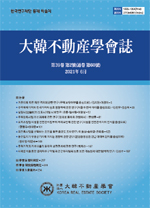- 영문명
- Economic Feasibility Assessment of Smart Space Development Projects: A User-Centered Value Evaluation Using Price Sensitivity Measurement
- 발행기관
- 대한부동산학회
- 저자명
- 김재환(Jae Hwan Kim)
- 간행물 정보
- 『대한부동산학회지』제77호, 27~51쪽, 전체 25쪽
- 주제분류
- 사회과학 > 지역개발
- 파일형태
- 발행일자
- 2025.09.30

국문 초록
본 연구는 부처에서 추진되고 있는 스마트 공간 조성사업에 대해, 사용자의 체감 기반 지불의사금액(Price Sensitivity Measurement, PSM)을 분석하여 경제적 타당성을 실증적으로 평가하고자 한다. 기존의 스마트 공간 관련 연구가 기술 중심적 접근에 집중되어 있었던 반면, 본 연구는 실제 사용자 관점에서 지불가치와 수용 가능 가격대를 도출하고, 최적가격을 중심으로 정책적 해석을 시도하였다.
본 연구는 국토교통부가 추진 중인 2024년 스마트도시 솔루션 확산사업 대상지인 증평 군, 당진시, 포천시 3개 지역의 리빙랩 참여자 총 80명을 표본으로 하여, 스마트 공간과 스마 트서비스 에 대한 PSM 설문조사를 실시하였다. 분석 결과, 스마트 공간 조성에 대한 수용 가능 가격 범위는 31.5만 원에서 108만 원, 최적가격은 42.5만 원으로 나타났으며, 스마트서비 스에 대해서는 수용 가능 범위가 3.5만 원에서 5.0만 원, 최적가격은 4.5만 원으로 도출되었다.
이러한 결과는 향후 스마트 공간 및 스마트서비스의 설계, 예산 편성, 주민설명회, 민간 위탁 등의 정책 수립 과정에서 주민 수용성 기반의 정량적 기준으로 활용될 수 있다.
특히, 본 연구는 사용자 중심 가치 기반 접근을 통해 스마트도시 인프라의 조성 및 운영비 통합분석과 공공서비스 타당성 평가에 있어 실질적인 기초자료를 제공한다는 점에서 학술적・ 정책적 의의를 갖는다.
영문 초록
This study aims to empirically evaluate the economic feasibility of smart space development projects— promoted as part of national smart city policies—by applying the Price Sensitivity Measurement (PSM) method to identify users' perceived value and acceptable price range. While most previous studies have focused on technology-driven approaches, this research places emphasis on a user-centered perspective, quantitatively measuring willingness to pay (WTP) and identifying optimal price points.
The analysis was based on survey data collected from 80 participants across three regions— Jeungpyeong, Dangjin, and Pocheon—selected as part of the 2024 Smart City Solution Expansion Program by the Ministry of Land, Infrastructure and Transport. All participants had engaged in Living Lab activities in their respective regions. The study conducted separate PSM analyses for smart space construction and service provision. Results indicate that the acceptable price range for smart space construction lies between KRW 315,000 and KRW 1,080,000, with an optimal price point of KRW 425,000. For smart services, the acceptable range was between KRW 35,000 and KRW 50,000, and the optimal price point was KRW 45,000.
These findings provide practical implications for setting policy-level budgets, designing differentiated service models, and justifying investment decisions. In particular, the study contributes to smart city policy by offering a quantifiable, demand-based reference for determining cost-effectiveness and securing public acceptance.
목차
Ⅰ. 서론
Ⅱ. 이론적 고찰
Ⅲ. 연구설계
Ⅳ. 지불가치 분석결과
Ⅴ. 결론
참고문헌
키워드
해당간행물 수록 논문
참고문헌
최근 이용한 논문
교보eBook 첫 방문을 환영 합니다!

신규가입 혜택 지급이 완료 되었습니다.
바로 사용 가능한 교보e캐시 1,000원 (유효기간 7일)
지금 바로 교보eBook의 다양한 콘텐츠를 이용해 보세요!



